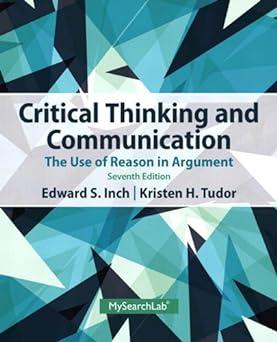1. What fact, value, and policy-based propositions might arise from this discussion? Would you sell a kidney...
Question:
1. What fact, value, and policy-based propositions might arise from this discussion?
Would you sell a kidney to pay for graduate school? What if selling a lung or skin could help make house payments during economic downturns? Would you be willing to sell an organ of a deceased loved one if it financially helped your family? Most countries have laws prohibiting the sale of organs. The United States outlawed selling organs with the passage of the National Organ Transplant Act in 1984. There are very few places in the world where organs can be sold legally, even though demand has increased steadily for decades. With inadequate supplies and a growing underground market, the question of whether the sale of human organs should be allowed has reemerged. Below is a discussion between two classmates highlighting many of the arguments in support of allowing compensation for organ donation. As you read the arguments, think about the fact, value, and policy claims that would make up the propositional arena.
Katie: I wish I had the opportunity to sell my kidney and pay for school. It seems to be a win–win. I can save a life, I don’t need the extra kidney, and I can eliminate my college debt.
Jonathon: I agree. And it’s not just college students who could benefit. Why shouldn’t the people who donate the organs of their deceased loved ones at least be allowed to have funeral expenses covered?
Katie: That’s a great example of how allowing compensation for organ donation wouldn’t just help the rich, but would benefit the most vulnerable people in society. It could give them real choice and help them out. We also need to remind people that there is already a huge underground, illegal market for organs, and many poor people are exploited by brokers who make massive profits by praying on those in need. All our current policies have done is make illegal activity profitable and unsafe. If we could sell our organs, it could be done safely and fairly.
Jonathon: I have heard that some people object to allowing the sale of organs because they think we should not objectify the human body. But Americans seem to be okay with allowing the sale of blood and sperm, and a woman can get paid a lot to donate her eggs, but you don’t hear many people say that’s immoral. Katie: And with the example of blood, sperm, and eggs, we can see that commercial markets have increased the number donors. So far, we seem to have managed these markets well. It seems to me we could do the same thing with organs.
Jonathon: U ltimately, this is about doing something to save human lives. We need to remember how many lives would be saved with more donors. I know I personally wouldn’t really think of donating an organ unless I was given money. How else are we going to increase organ donations?
Step by Step Answer:

Critical Thinking And Communication The Use Of Reason In Argument
ISBN: 9780205925773
7th Edition
Authors: Edward S. Inch, Kristen H. Tudor






